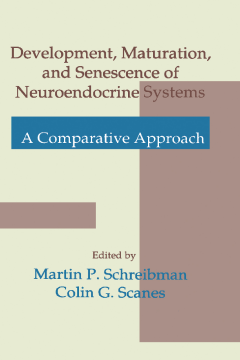
Additional Information
Book Details
Abstract
Development, Maturation, and Senescence of Neuroendocrine Systems: A Comparative Approach discusses the various phases of the aging continuum of neuroendocrine systems. This book explores the fundamental and physiological component of animals, which is an essential contributor to senescence.
Organized into three parts encompassing 21 chapters, this volume starts with a discussion of the concept of neurosecretory neuron that was introduced by Ernst Scharrer in 1928. This book discusses the challenges in the study of the development of the neuroendocrine system in insects, with a focus on Lepidoptera. Other chapters consider the neuroendocrine mechanisms that control the physiological processes in crustaceans. The reader is then introduced to the major neurohemal structures in crustaceans, including the sinus gland, the pericardial organs, and the post-commissural organs. The final chapter discusses the two brain systems that show impact of endogenous steroids that account for subsets of senescent changes.
This book is a valuable resource for neurobiologists, molecular biologists, and immunologists.
